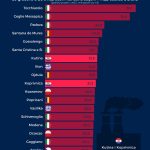And a few reasons why it can get you in trouble. Last month, we published an article called 25 Things to Know about Croatian Mistakes Speaking English. We tasked our favourite Croatian teacher, Mihaela Sego, owner of Cro to go, a Croatian language school for foreigners, to come up with the reverse article – where do foreigners get in trouble trying to speak this impossible language?
A few days ago I got what seemed at the time to be a fun project – write an article about mistakes foreigners make when speaking Croatian. Piece of cake, I thought, and got to work. However, my mind kept focusing on the mistakes Croats make when speaking Croatian.
Take “pekara” for example. The Croatian word for bakery can be seen all over the place in the centre of a city. Why is it so difficult to write “pekarnica”, people? P-E-K-A-R-N-I-C-A.
Simple as that! Let me explain: Pekarnica is the official Croatian word for bakery shop. Apparently, it exists only in Croatian language textbooks and in the dreams of enthusiastic Croatian teachers. Pekara, however – is not a word for bakery shop. However, it exists in real life, in fact, you can find it on every corner in Zagreb.
Or the case of simple and sweet little word ŠTO? (What?). Croats seem to have developed a mysterious allergic reaction to these three harmless letters – and they just have to say – ŠTA?
***
However, identifying mistakes foreigners make when learning Croatian was a more challenging task, so I asked my students to help me out.
“No problem,” John said, “I can easily make 25 mistakes in one sentence!”
And then we got to the centre of the most difficult thing for foreigners when learning Croatian. The cases.
Rose is a rose is a rose is a rose. Not in Croatia, it appears.
So here they are, the first seven mistakes, or the famous Croatian cases.
- Nominativ ruža/rose
- Genitiv ruže/rose
- Dativ ruži/rose
- Akuzativ ružu/rose
- Vokativ Ružo!/ Rose!
- Lokativ o ruži/about a rose
- Instrumental s ružom /with a rose
And that’s only the singular form. I still remember my students’ expressions when I explained that there are seven cases in Croatian and that most words change according to these. I’m sure they still think I made it all up.
But don’t worry, some Croatians still don’t understand why a rose is not a rose.
8) Voljeti vs. željeti
Voljeti – to love
Željeti – to wish (for)
Cases are ok, it won’t matter if you ask a waiter: “Molim kava s mlijekom” (nominative) instead of “Molim kavu s mlijekom” (accusative)
You’ll still get what you asked for – coffee with milk.
But, if you repeat several times to the waiter: “Volim točeno pivo!” (I love tap/draught beer) instead of “Želim točeno pivo!” (I want a tap/draught beer), I’m not sure you’ll get a tap/draught beer. The waiter might think you’ve had one too many.
There is a secret connection between voljeti and željeti and many foreigners mix the two.
9) Volim te vs. molim te
Croatian verbs can get you into tricky situations – if you mess up one letter, you can accidentally declare your love to someone.
Imagine my surprise when, one morning when I woke up and started checking my emails and found an email of one of my new students, which said Volim te! (I love you).
What? I almost spilled coffee on my laptop. It took me a few minutes and plenty of caffeine to recover from this declaration of love and realise that the man wanted to reply to my “Can we have our lesson later today?” with “Please!”, or molim te, but he ended writing volim te.
10) Pisati vs. pišati
Pisati – to write
Pišati – to pee
The devil is in the detail, we all know that. A tiny diacritic above the letter can change the course of a conversation. It’s very different if, at a business meeting, you want to say “I have to go home, I have to write a report” and you end up saying “I have to go home, I have to pee a report.”
In Croatian, it’s very easy to confuse the two: Moram pisati vs Moram pišati.
In any case, try avoiding the verb pišati after you come to Croatia. Sorry, I meant the verb pisati.
11) Where should I put the olives?
Imagine sitting on a beach on a warm summer night, enjoying the sunset, just like Pia did.
Pia is Swedish, she has been living in Croatia for over a year now and she has been learning Croatian.
So, she wanted a glass of wine with a few olives on the side, she listed all the Croatian prepositions in her head, picked the right one and asked the waiter to bring it to her.
He came back with a glass of wine with olives in it.
The waiter was kind and asked Pia “Is this what you meant?”, to which she replied “Yes, that is exactly what I meant.”
12) Porez vs. prozor
Porez – tax
Prozor – window
Pia told me about the time when she wanted to pay taxes in Croatia. Croatian bureaucrats are sometimes not fluent in English, so she said “Želim platiti prozor.” (I want to pay my window).
– What window? the clerk asked, confused
– You know, my prozor, p-r-o-z-o-r.
A few miming actions later, the clerk realised that Pia hadn’t broken any windows and it was all sorted out.
13) A bunch of words
It’s not only porez/prozor, there are numerous other similar-sounding words with very different meanings, including
Vatra vs. vrata (fire vs. door)
Or
Ljudi vs. ludi (people vs. crazy)
Oh, well… Ljudi su ludi. (People are crazy).
14) The other bunch of words
There are also words which sound similar in students’ heads and they mix them up with no apparent reason, like
Šunka vs. sudoper (Ham vs. sink)
Or
Važan vs. zaposlen (Important vs. busy)
People will think you’re strange if you say
Šalica je u šunki. (The cup is in the ham)
Or if you reply I’m important! (Važan/na sam) instead of I’m busy (Zaposlen/a sam) to someone asking you how you were.
15) Ti vs. Vi
These mistakes are nothing compared to the most important Croatian question – Možemo na “ti”?.
Croatian has a formal and an informal way of addressing people and they define your relationship with the people you are speaking to, the formal Vi (You, sir, for example), and the informal Ti (You, talking to a sibling, friend, etc.), much like French (Vous vs. tu), for example.
There is no simple answer to the Croatian question Kako si?/Kako ste?
This is what happened to Mike, a friend of mine who has been living in Zagreb for a couple of months now and who has been buying cigarettes every morning. He spoke to the lady who works at the kiosk using the formal way, Vi.
However, one day she got angry, threw the cigarettes at him and said: “I thought we were friends! I’m not so old for you to call me ‘Vi’”.
Then, there are people who will get upset if you address them informally, using ti. What about your mother-in-law? Ti or Vi? You can, paradoxically, like me, keep referring to the employees of your local supermarket as Ti, and then use Vi when addressing your mother-in-law, who is their age. So, if you have a Croatian mother-in-law, play it safe and ask: Kako ste Vi, gospođo? (How are you, Madam?)
16) Gender
Kako si?, Croats will ask you a million times a day. It’s not the same if you reply
Ja sam dobar and Ja sam dobro. (I am good (singular, male) vs. I am well).
I know you’re a good person, but I want to know if you’re well.
17) Me, myself and I
It sounds unbelievable for a nation that likes talking about itself and its failures all the time, but we avoid using the word “ja” (I).
You won’t sound Croatian if you say Ja sam jučer išao u dućan jer sam ja morao kupiti….
(I had to go to the shop yesterday because I had to buy…)
Croatian verbs do not require a subject, so when in doubt, be modest, and don’t use “ja” (I).
18) Kino or bioskop
Bioskop – Serbian word for cinema
Kino – Croatian word for cinema
Kava – Croatian word for coffee
Kafa – Serbian word for coffee
Can I say “I am going to bioskop?” my studend John asked one day.
Yes, but you’ll get in trouble!
Serbs and Croat understand each other perfectly, but don’t try to drink kafa or go to bioskop in Zagreb. Which brings us to our next problem.
19) Ideš sa mnom u kino?
kino – cinema
Kina – China
Remember how I told you you had to learn cases?
Kino means cinema, Kina means China.
If you ask your girlfriend “Ideš sa mnom u kino?” it’s not the same as asking “Ideš sa mnom u Kinu?” because the first case means you want to take her to the cinema, and the second that you’re suggesting a trip to China.
20) Accent
I know you’re excited that you’re speaking hrvAtski and accent might not be the most important thing to you.
But, the word hrvatski is not pronounced hrvATski, but hRvatski. I know, you still hear CNN reporters saying that they’re live from saraJEvo or dubROvnik, but if you want to sound Croatian, forget about CNN and say SArajevo and DUbrovnik.
21) Me Tarzan You Jane
“I don’t ask for much! Just teach me to talk Croatian like Tarzan, just enough to get by!” a man who wanted to learn Croatian told me.
The belief that you can speak Croatian like Tarzan is one of the biggest mistakes you can make. Sorry, but you can’t even order a cup of coffee without using real grammar. Well, you can avoid grammar, but don’t blame me if you end up living with your girlfriend in China.
22) The famous Croatian “je”
“It’s sunny”, or “Je sunčano”, right? Wrong.
Every Croatian Tarzan will tell you:
Sunčano je. (It’s sunny)
I know, I told you earlier that you can’t speak Croatian like Tarzan. But “je” simply cannot be at the beginning of a Croatian sentence.
Je li tako? (Is that right?) – Je tako! / Right it is.
Ooops, sorry, Tako je! (It’s right).
23) He never doesn’t do nothing around the house!
On nikad ništa ne radi kod kuće! – every average Croatian wife will complain about her husband. Is he really that lazy that she had to use triple negation?
Ja nikad ne spavam / I never don’t sleep. Ja nikad ne idem u kino / I never don’t go to the cinema.
Don’t even try to figure this one with double negatives out. Just deal with it. And never question this rule!
24) Crazy Croatian questions
Vještica – witch
Vrećica – shopping bag
Sometimes you will just find yourself trying to answer some crazy questions Croats will ask you. Like my friend Mike.
Why would she ask me Do you need a witch?, Mike asked himself when a shop assistant politely asked him Trebate vrećicu? / Do you need a shopping bag?
Finally, when learning any language, you might think that you lack words, but how can you have a surplus?
25) Aaaaaa! The problem of the disappearing A
I am going to Zadar. Right? Right.
Ja sam iz ZadAra. I am from Zadar. Right? Wrong. Ja sam iz Zadra.
Where did the second A disappear? Don’t ask. Nobody knows.
What can I tell you? All kind of things are possible in Croatian! But remember:
Don’t think – I will never not learn Croatian!
Oh, no, this did not sound right! Here it goes:
Don’t think: I will never learn Croatian. And just don’t try to translate double negatives – and you’ll do just fine speaking this beautiful language!
If you want to learn more about our beautiful language, visit Cro to Go.









